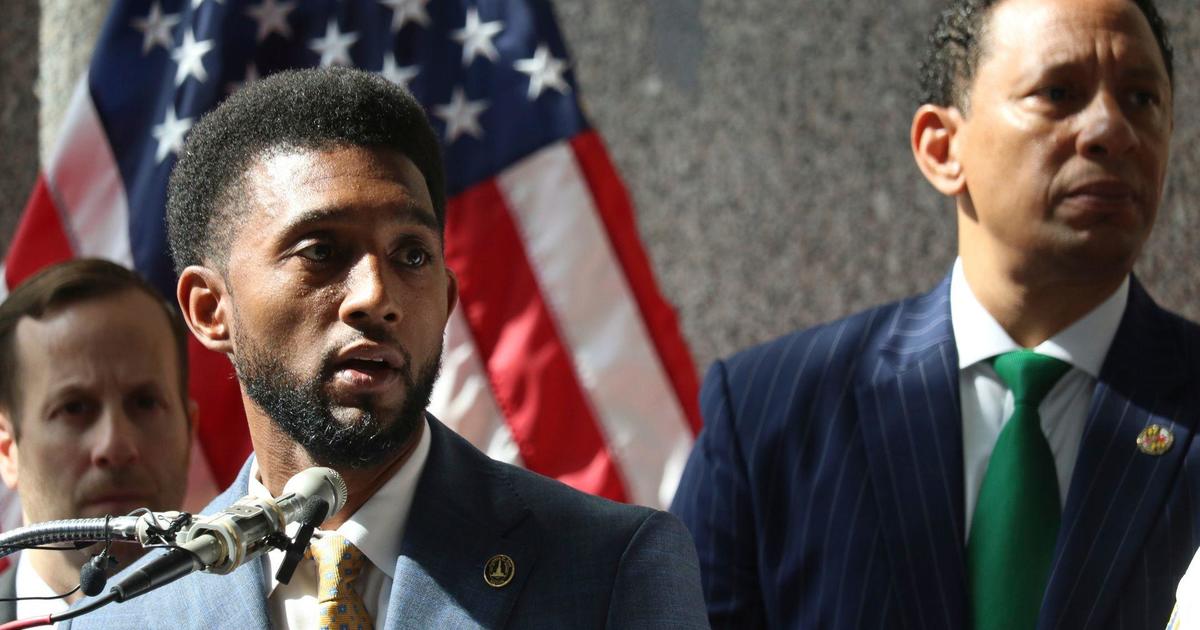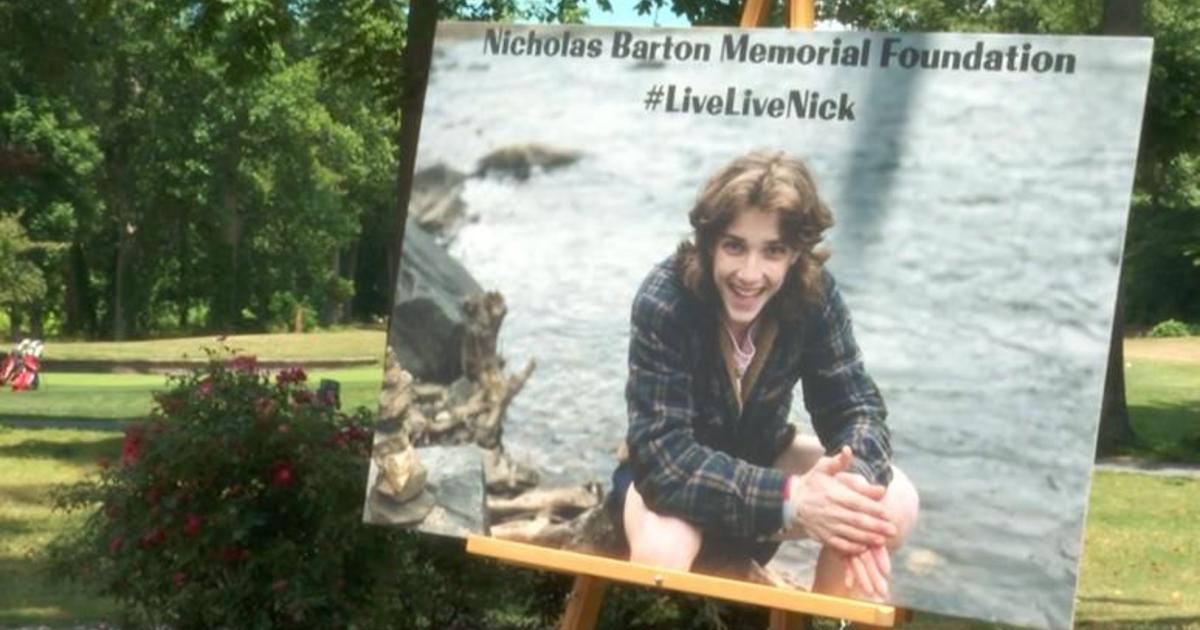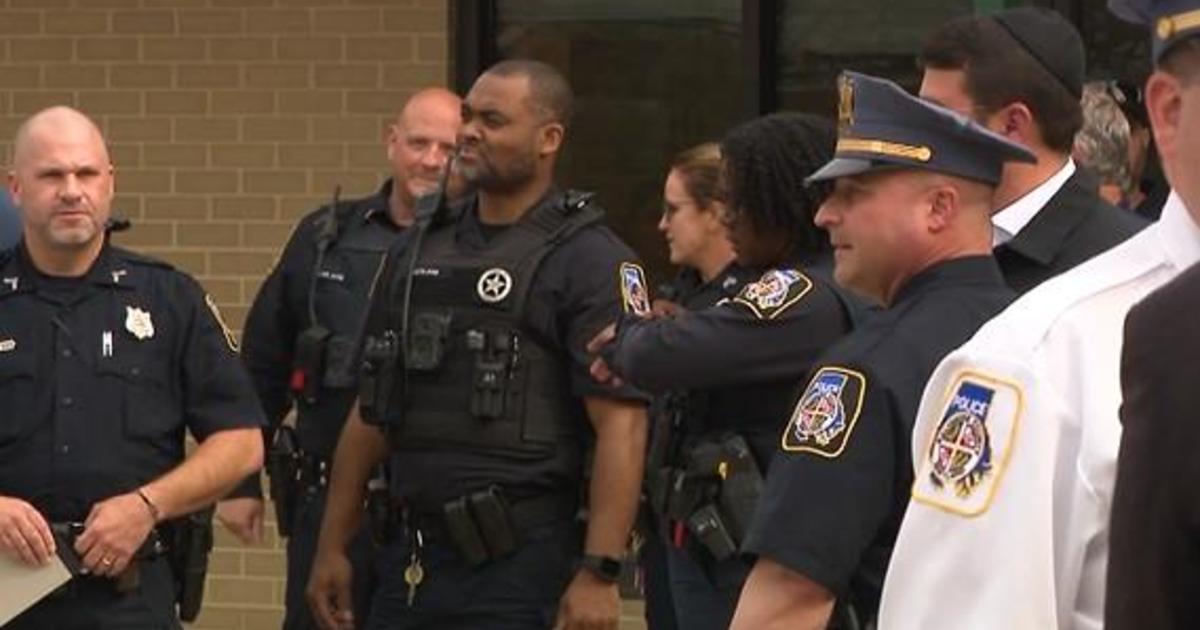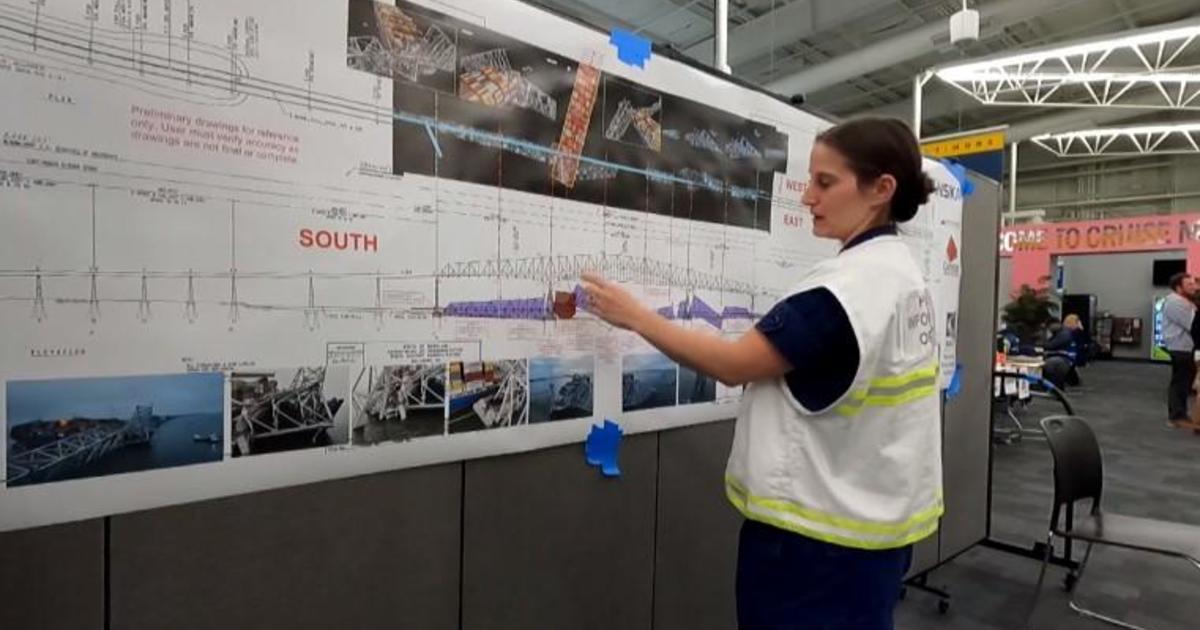Baltimore's New Police Commissioner Hopes To Reform Department, Change Public Perception
BALTIMORE (WJZ) -- Baltimore's new police commissioner Michael Harrison was sworn-in this week.
In an interview with WJZ, Harrison talks about how he'll reform the city's troubled police department and hopefully change its culture.
'Accountability' Top Priority For New Baltimore Police Commissioner Michael Harrison
He's also hoping to change public perception
Harrison sat down WJZ's Paul Gessler to talk about the job ahead of him.
MICHAEL HARRISON: First of all, my wife and I love the city. We came up for a week looking for a place to live. That went well. Of course I started on Feb. 11. I spent the first two weeks doing community meetings -- five the first week, four the second week. Still doing that almost every other day. People want the same things. They want safety, they want a safe neighborhood. They want a place for the kids to play. Good schools, good housing and job opportunities. And they want the best training, and the best equipment and the best resources and a good quality work environment to work in. All of which I'm advocating for.
PAUL GESSLER: So I don't need to tell you, you're the 4th commissioner now in 14 months. There's been a lot of turnover here. You have a 5-year contract that show the average citizens and a lot of the rank-and-file that you intend to stay. What gives you confidence that you'll be leaving this department in 2024?
MH: First of all, my wife and I moved to Baltimore and I made the commitment once I agreed to the mayor that I would be here for the long haul, so in my mind, my heart and my soul, I'm going to give it everything I can. And I believe I'll be here until the task is complete. And that is the work with this mayor and this city to make sure we can change the culture of violence in this community, by which people are making decisions to commit violent crime. Change the culture of the police department -- to make sure it's a well-run, high-functioning, well-disciplined police department that serves its citizens well every day. And is respectful and responsive to the citizens' needs. And then together implementing this consent decree and reforming the department to make sure that we are doing our job in a very constitutional way, meeting the mandates of the consent decree. But, let's be clear -- we want to reform because reform is needed. Reform is deserved. And we want to be a good police department. And so I've been charging the members of our department to make sure we do everything we do because it's the right thing to do and never the consent decree makes us do it. Yes we're under a consent decree and yes, we're going to comply with its mandates, but we have to own this. We have to acknowledge where we were and where we are and own it and go forward and make the reform because in the end we want to be able to say we turned ourselves around and we want to be able to say we can now produce leaders who can be police chiefs here and elsewhere.
PG: I assume you read the Department of Justice report released about the city a couple of years ago. What stuck out to you in that report and were there any similarities to New Orleans and Baltimore that you remember?
MH: I think there were more similarities. I don't think anything really stuck out. It read very similar to New Orleans. There were things that happened that really drove citizens perceptions and things that happened that talked about the erosion of trust. It really spoke to a culture change -- patterns, practices and behaviors. And it spoke to the need to change the holistic culture that's probably generations old. There's a real need for improved technology. There's a need for best practices. There's a need for better training at every level to make sure we're bringing in the best training and the best thought leaders to change more on our customer service approach, but we're investigating in a constitutional way. We're meeting people -- there's a great community engagement component built in that we have to meet. All of those things build trust -- transparency. So I'm looking at all of that. I don't think there's any one thing one thing that stuck out cause there's a lot of things that stuck out. Coming from New Orleans, when you thought you saw the worst the DOJ could say about a department -- they said very similar things about Baltimore. So I think the familiarity with it and having survived culture change in New Orleans, led by my predecessor, and then I took over in year two of the consent decree, I think having survived and led culture change made the decision easy for me to accept the offer to come here. Knowing what's in front of me, knowing its a big challenge, but knowing that you can come out of it. And then be able to tell the story that you were able to self correct and change because we wanted to.
PG: You mention generational issues -- just with a lot of citizens of Baltimore -- there are generational thoughts about police, With coming up through zero tolerance, a lot of people have a very negative perception of police, when they see a police officer. A lot of people understand why Freddie Gray turned and ran. How do you tackle that -- a generation of Baltimore citizens, who have marks on their record, who have come up through zero tolerance, who have this negative perception of the badge?
MH: Well I think we start here and we start now with what we have and where we are right now. Communicating that we are a department that's making holistic reform. Yes, we're under a consent decree, but we want to do this and we're owning it. And while we're recruiting new people in, we want to retain our good people, we want to train up our individuals to make sure we're the best possible police officers we could possible produce. And then demonstrate through our daily delivery of police services that we can police the city, that we can be proactive in a very constitutional, fair and just way -- while having high levels of citizen engagement, creating a robust community policing philosophy that has great community policing initiatives that build trust and build relationship and open lines of communication. All of that being done at the same time. I think overtime we'll be able to change the citizens' perceptions, not that they'll say that we were whatever they accuse us of, but to say that we were able to change.
PG: Certainly you weren't here during the Gun Trace Task Force, but you own it now. it is your problem to deal with. How do you deal with the fallout from that and ending corruption, whether the reality of it, the perception of it or a mixture of both that people see that and say those cops are corrupt.
MH: You bring up a good point. I think you look at my first decision when things were brought to my attention with the indictments from last week, and then names that were followed. And my response to it. And I think things were happening. And I would ask the citizens to not always look at what will happen, but to also look at the department's response to it and how we tackled it. So it's about building systems of accountability that inform us, about good behaviors and bad behaviors and good supervision and bad supervision, good management and bad management, good leadership and bad leadership and when things are brought to our attention -- what do we do about it? And when people, who fail to take the correction, what's done to them? And that those systems inform us so that we can know the things that we once did not know. And so we can track and measure, when things are reported -- when people take the correct action, or not the correct action or fail to take any action -- and there's consequences for that. That are strong and certain, but fair and just. And I believe implementing and creating those systems, some of which are technological, some of which are human systems. That those systems that are not in place now -- and the ones that are in place need to be improved -- those systems inform us, so that I can hold people accountable at every level. And I think that is the core of making sure that bad acts like that don't continue and that when things happen, even when we start experiencing culture change, that the response to it is the appropriate response that demonstrates accountability and transparency to the residents.
PG: How do you feel about plain-clothes units, in general, here in Baltimore?
MH: I'm not really in favor of plain-clothes units. What I've seen are officers who are outfitted with regalia that clearly indicates that they are members of the Baltimore Police Department. I think there should be some uniformity in what we all wear. We should be clearly identified as members of the Baltimore Police Department. Certainly, there are some operations that are covert in nature that require surreptitious operations where people are pretending to be others in undercover operations and surveillance operations. Those are different. When it comes to street enforcement, we have to be clearly identified as members of the Baltimore Police Department. Those are policies we're looking at now making sure we're aligned with best practices and, going forward, we're going to come out with what we believe to be an acceptable best practice.
PG: A lot of people don't have frequent interactions with police, so what will the average citizen see tangibly different with the police department in, say, the first 100 days?
MH: Well, I think you'll see us make a good faith effort to be more engaging, more pro-active in our community policing initiatives. And, yes, we're conducting walking beat assignments now, but I think while walking, we need to be really more proactive and engaging, introducing ourselves to members of the communities we serve, maybe sitting down and taking a listen to what they have to say about what's happening in their neighborhoods, certainly if they're willing to tell us. So, we want to get out of our cars. We want to be more engaging. When it comes to enforcement, we want the officers to be more proactive. We can be aggressive, but not abusive. There's a very difference between the two I want to make sure our team members are clear about. So, when it comes to open-air drug markets, when it comes to people committing violent crimes, I want our officers to pursue those individuals relentlessly, so we can demonstrate that we care about the concerns and we're doing our part to apprehend people who commit those crimes, but we're setting the tone that it's unacceptable and that we want to prevent it. And, then, I think that culture change within the department and the officers know that we back them up and that we support them, especially when they're making the right decision and doing the right things, that's what they're looking for. As their leader, I want to demonstrate that we're going to support our officers. We want to make sure when mistakes are made, we hold people accountable, through training, through discipline, and not that we're overly punitive. We just want to self-correct.
PG: There's a new head of the FBI's field office here in Baltimore. What role do you see federal partners like the FBI playing in getting a handle on the violent crime here?
MH: I think everybody has a part to play in this and I met with all our federal partners a week before last, and there are regular meetings we're having all the time, even with our state partners, to make sure it's a collaborative, coordinated effort to make sure we're all in this fight against violent crime, to make sure each of us has a role to play in how those roles connect and interconnect with each other's agencies. And, so, I'm convinced there's a really robust and very good partnership between the BPD and our federal partners and the head of the FBI. The FBI has a clear role and they've been great partners and I look forward to continuing that.
PG: The second day on the job. I don't expect you to have this stat on the top of your head. Do you know the homicide clearance rate so far this year? Maybe that's something Matt can get us later? (*Note: BPD spokesperson Matt Jablow provided WJZ the up-to-date number after the interview. The current homicide clearance rate is 40 percent.)
MH: We can get that for you. That fluctuates from day to day.
PG: What's the acceptable number for you?
MH: Well, I think an acceptable number--
PG: What's a realistic goal?
MH: We always want to have a high clearance rate--100 percent is what everyone hopes for, and we hope to have the kind of citizen-police relationship that we have information coming to us and we hope to have the kind of technology that would give us the ability to clear all of them. I think there's always room for improvement, and I think we need to make sure we balance the staffing so that it's equitable and it is in line with national best practices for what caseload should be and we're not overtaxing our investigators with a caseload that's far beyond what they should handle in a year's time, outside of the national best practice. I think once we get in the national best practice of caseload-per-officer, we should always envision and work toward having a clearance rate that's a national--a national average clearance rate.
PG: A lot of police commissioners have used their title to testify in Annapolis--to change some sort of criminal justice law statewide. Have you had a chance to really dive in, in terms of what you might want to see changed from a criminal justice perspective in this state? Anything that's holding you back?
MH: A little bit in early introductory meetings in Annapolis, not really testifying before them, but giving some information and giving some questions and answers in both the House and the Senate and I think making sure that we have strong consequences for gun violations. I've said this over and over again here and in New Orleans and everywhere else in the country where I've traveled that the decision point for using the gun and pulling the trigger is not made when you've pulled the trigger. The decision is made when a person decides to carry the gun from wherever they got it from, whether it's home or anywhere else, and once you've left the security of your home and walked and left to go anywhere with that gun, you've pre-determined that should you have to use it, you're willing to use it, and that's what we're seeing. And, so we have to change the culture by why people even think they need to have a gun, why they think they need to carry that gun. Because, we know now when they carry, when they see people in their conflicts, that's how they're going to solve the conflict. That's a big part of what we're experiencing with this gun violence that we have to correct. Growing the department, retaining people, making sure we're properly staffed, and then using the best technology and best staffing solutions to deploy and staff correctly, and then making sure through legislation that our consequences are strong, but fair, to deter people from making bad decisions.
PG: A lot of people--past commissioners--have also your position to really hammer home the point that juvenile crime is out of control, that a lot of adults are using juveniles to commit crime because they know lighter sentences will be on them. Have you had a chance to really dive into that issue and is that something that we can expect to hear from you in the--
MH: I think you can expect to hear a lot about that from me in the future. That was a big problem in New Orleans and juveniles were being released with little or no bail and, now, for all misdemeanors, they're being released in New Orleans with no bail. And, there are no consequences, or very little or few or weak consequences. I think what I've seen here just on the surface in a month's time is very similar. The consequences are either non-existent or they're extremely weak, so there's no deterrent factor for juveniles to even make better decisions, but that means we have to do a better job and a must more robust job changing the culture and their decision-making process and getting in front of the reasons, the root causes, that make them want to commit crime: the peer pressure, the lack of skills and jobs and opportunities, and what will happen to them if they stay on this course, making sure we can reach them there, because if we're losing ground with consequences, then we have to strengthen what we're doing on the front-end, while making sure we have a well-run police department that's responsive, but not overly aggressive and over-punitive with juveniles.
Matt Jablow, Police Spokesperson: Paul, we have about 2 more minutes. He's really got to get going.
PG: There's a debate in council about staffing right now. Some city councilors say there is no staffing issue. Others say you're hundreds and hundreds officers short? Where is it realistically? How many officers short are you right now, if any?
MH: When I took the job, it was reported to me we were somewhere between the area of 500 officers short of what the department could be budgeted for. I want to make sure that the department has the right number of officers, but that we're adequately staffed in patrol, but that's a balancing act between making sure our investigators have adequate staff so that we don't overtax them going beyond the national best practice for caseload and then we start having inadequate investigations because of that. I want to make sure that's balanced against patrol and, then, the non-committed time assignments to do pro-active police work and community policing. And, so, it's a balance between all of that, but there are some specialty assignments that we have to have to just make sure we can respond to SWAT situations, situations on water and in air and in all of the assignments that make us a full-service police department. I believe we're being all things to all people. I think it's time for us to assess what's the priorities and make sure we're responding to those priorities and making sure that we can civilianize the department to put officers in positions that civilian staff can be hired to perform, moving those officers back into policing services--that's what we signed up to do anyway--but, hiring the right professional staff to handle clerical and professional jobs, utilizing and building the best technology to offset some of that work. When we do all of that, we will actually have a force-multiplier in putting officers back in the field, but it's also reducing the workload because we're digitizing some of the paperwork and digitizing some of the work, which is a reduction in burden, which frees up officer time. So, it's about growing the department. It's about being more effective and efficient. It's about civilianization. And, it's about the use of technology that gives more officers, but more free time for the ones we have now.
PG: So, no magic number, per say, but you want to make sure caseloads are--
MH: Well, there's no magic number right now. There was a staffing study done prior to me being here. I have not been able to go through all of it as of yet. And, in short time, I'll complete that, going through that staffing study. I think it's probably a year or older, but I want to be sure it's accurate for what we have right now. Should we need to be able to assess that, we will reassess that to make sure we're getting to citizens in the right amount of time on emergency calls, that we have adaquate amount of people to handle what may come our way on any given day, caseload for detectives, and free time to do community policing and engagement.
PG: And, lastly, Baltimore's been called the Heroin Capital of the U.S. The flow of fentanyl is going through our streets like crazy, as you know. Are there similiarities in New Orleans in terms of tactics that you plan on bringing here, and what do you plan to do to address the flow of drugs?
MH: We will still go after drug dealers. In New Orleans, I was part of the opioid task force, which was a public health approach led by the city's health department and members of the health care provider system and social service providers and all of the first responders were all part of that task force treating it as a public health crisis and offering services to people who are addicts and victims, not necessarily punishing people but still making sure we are strong in our enforcement against drug dealers who are really tearing away at the fabric of our society, creating more addictions and actually creating a larger crime problem, because they are perpetuating the drug sales and perpetuating addictions. But, when it comes to addicts and people who need medical treatment, we were changing our philosophy from enforcement to giving people medical treatment. That's an approach that I think is already under way here that we want to assess and make sure that will work here. Certainly, I'm open to that and would support that.
Watch more of the raw interview with Harrison below:
Follow @WJZ on Twitter and like WJZ-TV | CBS Baltimore on Facebook



